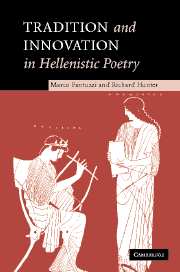Book contents
- Frontmatter
- Contents
- Preface
- List of abbreviations
- 1 Performance and genre
- 2 The aetiology of Callimachus' Aitia
- 3 The Argonautica of Apollonius and epic tradition
- 4 Theocritus and the bucolic genre
- 5 Epic in a minor key
- 6 The style of Hellenistic epic
- 7 The epigram
- 8 The languages of praise
- 9 Hellenistic drama
- 10 Roman epilogue
- Bibliography
- Index of passages discussed
- General index
3 - The Argonautica of Apollonius and epic tradition
Published online by Cambridge University Press: 22 September 2009
- Frontmatter
- Contents
- Preface
- List of abbreviations
- 1 Performance and genre
- 2 The aetiology of Callimachus' Aitia
- 3 The Argonautica of Apollonius and epic tradition
- 4 Theocritus and the bucolic genre
- 5 Epic in a minor key
- 6 The style of Hellenistic epic
- 7 The epigram
- 8 The languages of praise
- 9 Hellenistic drama
- 10 Roman epilogue
- Bibliography
- Index of passages discussed
- General index
Summary
EPIC SONG
Like Callimachus, Apollonius is a figure from the very heart of Alexandrian scholarship. Our sources are almost unanimous that he came from Alexandria itself; if this is correct, the designation ‘Rhodian’ must go back to some close connection with the island, perhaps through his family or because he spent time there. Be that as it may, Apollonius served as Librarian in the royal Library at Alexandria during the reign of Ptolemy Philadelphus and thus occupied perhaps the most important position of patronage within the institutionalisation of culture established by the first two Ptolemies, and what we know of his scholarly prose works clearly reflects the literary concerns of the Museum. Thus, in one treatise he tackled Homeric problems, including textual problems, in a manner which apparently took issue, in what might be thought a typically Greek agonistic spirit, with his great forerunner as Librarian, Zenodotus; in other works he discussed issues in the interpretation of Hesiod and Archilochus. Apollonius' career thus illustrates how textual immersion in the poetry of the past may become the basis for the production of new poetry.
However, unlike both his famous predecessor and his successor, Zenodotus and Eratosthenes, it is as a poet, rather than as a scholar, that Apollonius was best known both in antiquity and today, although – with the exception of the Argonautica – only the scantiest fragments of his poetic output survive.
- Type
- Chapter
- Information
- Tradition and Innovation in Hellenistic Poetry , pp. 89 - 132Publisher: Cambridge University PressPrint publication year: 2005



